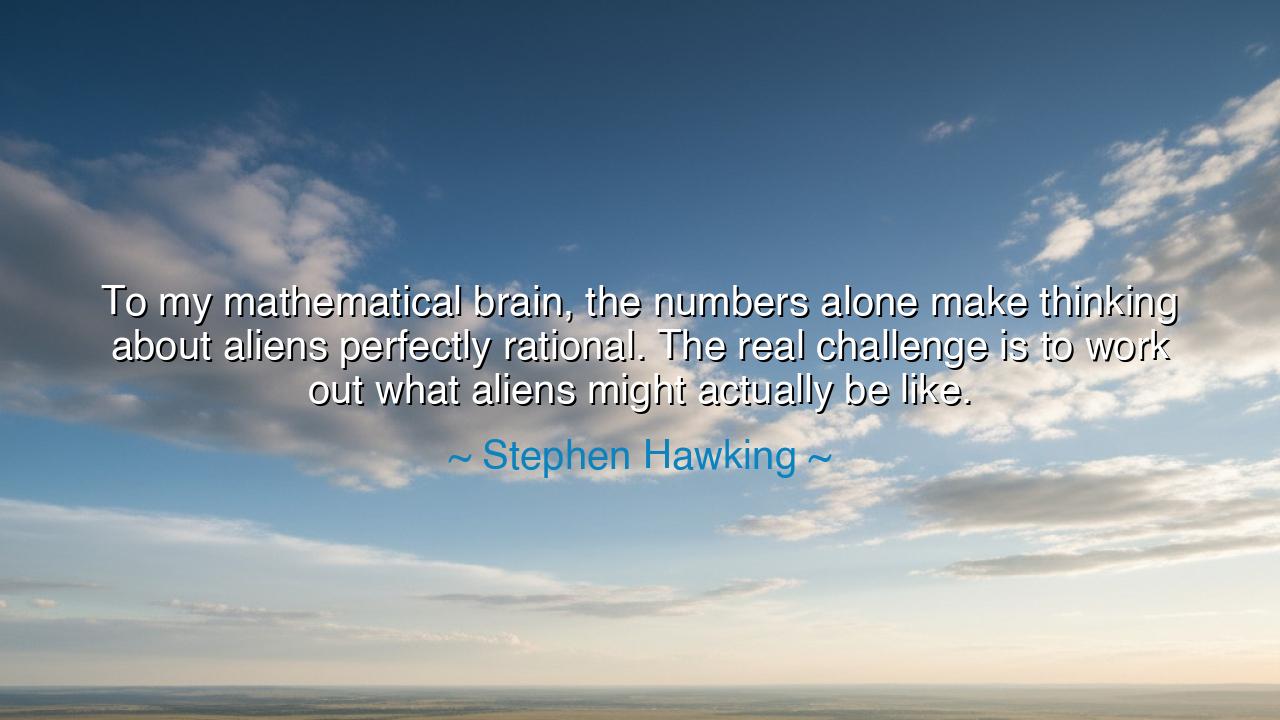
To my mathematical brain, the numbers alone make thinking about
To my mathematical brain, the numbers alone make thinking about aliens perfectly rational. The real challenge is to work out what aliens might actually be like.






“To my mathematical brain, the numbers alone make thinking about aliens perfectly rational. The real challenge is to work out what aliens might actually be like.” — Stephen Hawking
In these profound and wonder-filled words, Stephen Hawking, the great sage of the cosmos, invites us to gaze beyond the veil of our small blue world and confront the vastness of existence itself. With the calm clarity of reason, he reminds us that the universe is not a void of isolation, but an ocean of endless possibility. “The numbers alone,” he says, make it rational — indeed inevitable — to believe that life beyond Earth exists. Yet, as he continues, the true mystery is not whether such life exists, but what form it takes. Here lies both the majesty and the humility of science: it gives us the courage to believe, but also the wisdom to wonder.
The origin of this quote lies in Hawking’s lifelong pursuit of understanding the cosmos — a quest that transcended both body and time. Bound to a wheelchair by disease, yet unbound in mind and spirit, Hawking spent his life studying the forces that shape the stars, the black holes that swallow light, and the equations that govern the universe itself. In contemplating the statistical vastness of creation — hundreds of billions of galaxies, each containing hundreds of billions of stars — he saw in pure mathematical reason the certainty that life could not belong to Earth alone. For him, belief in other life was not an act of fantasy, but an act of logic, a reflection of cosmic order itself.
But Hawking’s words reach beyond the realm of science; they touch the deeper hunger of the human soul — the desire to know our place in the grand design. In ancient times, men gazed at the stars and imagined gods dwelling among them. The philosopher Epicurus, centuries before Christ, spoke of “innumerable worlds” scattered across infinity, each with its own suns and inhabitants. Even the prophet Job, in his suffering, asked, “What is man, that Thou art mindful of him?” The same question echoes in Hawking’s reflection — a question both scientific and spiritual: if we are not alone, what then are we? What does it mean to be human in a universe teeming with the unknown?
The phrase “the real challenge is to work out what aliens might actually be like” unveils a deeper wisdom — that our greatest obstacle is not in discovering others, but in understanding difference. Whether those others dwell among the stars or live beside us on Earth, the struggle remains the same: to see beyond fear, beyond prejudice, beyond self. In imagining alien life, we are forced to expand the boundaries of empathy — to imagine not only creatures of strange form, but minds unlike our own, civilizations that think, feel, and create by patterns unfamiliar to us. Thus, Hawking’s challenge becomes both cosmic and moral: can we open our minds enough to truly comprehend what lies beyond the horizon of the known?
Consider, too, how history has mirrored this cosmic parable. When Christopher Columbus first crossed the Atlantic, or when the explorers of ancient China and Persia reached foreign shores, they encountered worlds that seemed alien — peoples with languages, customs, and beliefs utterly different. Often, those first meetings were not met with curiosity but with conquest. The lesson is eternal: before we can reach for the stars, we must first learn to meet the stranger with reverence, not fear. For if one day we do encounter beings from beyond the heavens, our first test will not be of technology, but of character — whether we are a species capable of meeting the unknown with wonder, not war.
In this way, Hawking’s reflection becomes both a meditation on science and a parable of humility. He teaches that reason and imagination must walk together — that the same mind which calculates galaxies must also contemplate the mystery of life. To think of aliens, in truth, is to think of ourselves: our limits, our biases, our dreams. It reminds us that the human story is not the center of the universe, but one note in a divine and endless symphony.
So, O seeker of knowledge, take heed of Hawking’s wisdom. Let your mind be mathematical — disciplined, logical, precise — yet let your heart remain curious, open, and humble. When you gaze at the stars, do not merely ask, “Are we alone?” Ask also, “How might we live worthy of companionship in so great a universe?” For whether or not we find other beings among the stars, the lesson remains: the vastness of creation calls us to greater awe, greater understanding, and greater compassion. And in that journey — from reason to wonder, from fear to empathy — we become not just explorers of the cosmos, but citizens of it.






AAdministratorAdministrator
Welcome, honored guests. Please leave a comment, we will respond soon